World Environment Day 2025: Uniting to Beat Plastic Pollution and Protect Our Planet
- TPP

- Jun 4, 2025
- 3 min read

Every year on June 5, the world unites to celebrate World Environment Day, the largest global platform for environmental public outreach led by the United Nations Environment Programme (UNEP). Since its inception in 1973, the day has brought together millions to advocate for critical environmental causes. World Environment Day 2025, the theme— “ending plastic pollution globally”—calls for urgent and united action to eliminate one of the most pervasive and fixable threats to our planet: plastic pollution. The Republic of Korea will host this year’s global celebrations, bringing both experience and innovation to the forefront of this pressing challenge.
A Fixable Crisis: The Plastic Pandemic
Plastic pollution has infiltrated every part of our world. It leaches into the water we drink, contaminates the food we eat, and accumulates in our bodies. The scale of the crisis is staggering—over 400 million tonnes of plastic are produced annually, and nearly half of that is single-use, designed for brief utility before becoming permanent waste. Alarmingly, less than 10% of plastic is recycled, while 11 million tonnes end up in aquatic ecosystems each year—a weight equivalent to 2,200 Eiffel Towers.
Beyond environmental damage, plastic pollution contributes significantly to the triple planetary crisis: climate change, biodiversity loss, and pollution. Microplastics—tiny particles less than 5 mm in diameter—have been found in air, soil, and water, with each person unknowingly ingesting more than 50,000 plastic particles annually. The annual economic toll of plastic pollution is estimated between US$300 billion and US$600 billion, encompassing its harm to ecosystems, tourism, fisheries, and human health.
World Environment Day 2025 towards a Global Treaty: Progress and Diplomacy
This year's observance of World Environment Day coincides with international momentum towards a legally binding global treaty to end plastic pollution. In November 2024, the Republic of Korea hosted the fifth session of negotiations, with further talks set for August 2025 in Geneva. These negotiations signify hope, as governments, businesses, and civil society recognize the need to act decisively, guided by science and scalable solutions.
Host Country Spotlight: Republic of Korea Leads the Way
The Republic of Korea, hosting the Day for the second time since 1997, exemplifies leadership in sustainability. Over the past 28 years, the nation has significantly improved air and water quality, managed chemicals safely, and restored ecosystems. Now, it is pioneering efforts against plastic waste through a comprehensive life-cycle strategy that encompasses production, consumption, reuse, recycling, and disposal.
The 2025 celebrations will center in Jeju Province, which has committed to becoming plastic pollution-free by 2040. Jeju has implemented a mandatory recycling system that requires waste separation at source, boosting recycling efficiency. It was also the first in Korea to implement a disposable cup deposit system, showing how local policies can spark national transformation.
India’s Green Innovations: Tree Ambulance and Aravalli Green Wall

While the global spotlight turns to Korea, India continues to champion innovative environmental actions. In Pune, Maharashtra, the Tree Ambulance initiative will launch on June 5. Originally pioneered by Chennai’s Green Man of India, Dr Abdul Ghani, this mobile green rescue unit is equipped with tools like hydraulic chain saws, battery-operated cutters, and welders to treat distressed or damaged trees. Managed by the Pune Municipal Corporation, the service—Vriskha Rugnvahika—aims to remove nails from trees, treat diseases, and support plantation efforts. The ambulance will also offer public education on tree care and conservation.

In tandem, Prime Minister Narendra Modi will mark the Day by launching the Aravalli Green Wall project, an ambitious land restoration initiative spanning 6.45 million hectares across four states—Delhi, Haryana, Rajasthan, and Gujarat. With a budget of ₹16,053 crore, the project aims to combat desertification by creating a 5-km buffer zone around the Aravalli Mountain range. It is a critical component of India's pledge to restore 26 million hectares of degraded land by 2030 and create a carbon sink of 2.5 to 3 billion tonnes of CO₂ equivalent through increased forest cover.
Driving Change Through Action and Awareness
With science, technology, and policy aligning, 2025 marks a turning point in the fight against plastic pollution. UNEP’s #BeatPlasticPollution campaign will serve as a rallying call for communities, governments, and businesses to rethink the way we design, use, and dispose of plastics. The solutions are already in place: reducing plastic production, shifting to reusable alternatives, expanding recycling systems, and embracing a circular economy.
World Environment Day is not just a commemoration—it is a commitment. Whether through global treaties, national strategies, or grassroots innovations like tree ambulances, the message is clear: we must act now. Only through collective and sustained effort can we create a cleaner, healthier, and more sustainable planet for future generations.
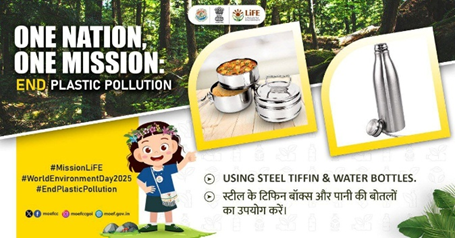
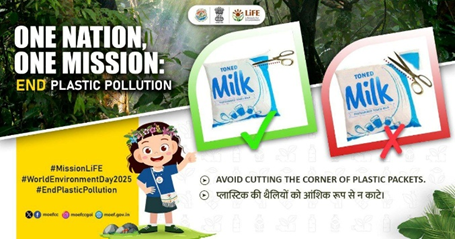
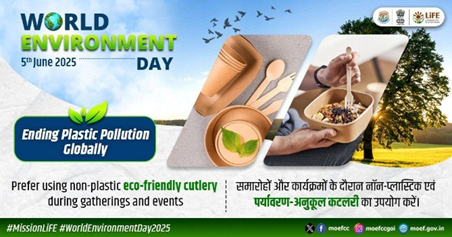
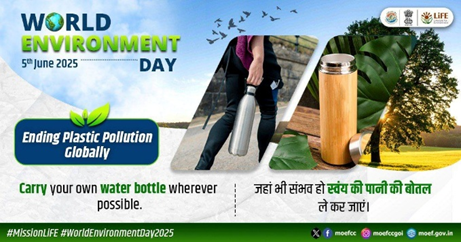
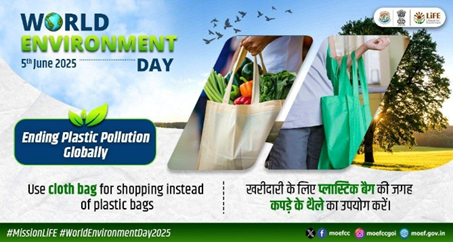
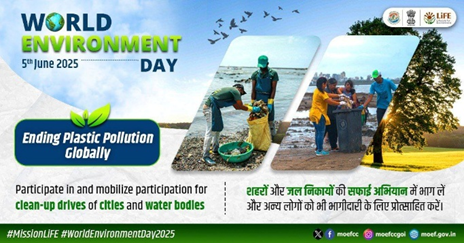



🔥
.
environment day🚵